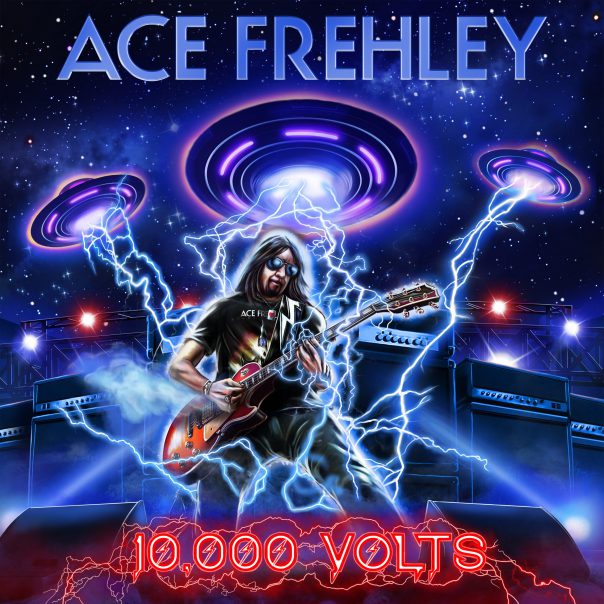ALBUM REVIEW: KISS’ Ace Frehley delivers the goods with ‘10,000 Volts’

Ace Frehley, “10,000 Volts.”
When KISS was inducted into the Rock and Roll Hall of fame in 2014, Gene Simmons said the guitar playing of Ace Frehley was “often imitated but never duplicated.”
10,000 Volts
Ace Frehley
MNRK, Feb. 23
6/10
Get the album on Amazon Music.
It was the most honest assessment of Frehley’s guitar skills ever spoken. It doesn’t matter who plays his guitar parts in old KISS songs. They can be note-for-note, supposedly spot on and you can still tell it’s not Frehley. He has one of the most rock and roll styles in rock and roll, if that makes any sense.
The man speaks with his guitar like very few other players. And, while frequently not part of the guitar hero conversation as the ’80s progressed, when he was out of KISS, he should have been.
You either love Ace or don’t get it.
I obviously love Ace. Anyone else in his KISS uniform, playing his parts, is a cover band refugee. Frehley is hard rock’s version of (former Rolling Stone) Mick Taylor or Elliot Easton (of The Cars). He’s the guitar player that always seems to play the exact lead a song needs, and aging into his 70s hasn’t changed that one bit.
So not long after KISS did its last tour (we think and probably hope), 72-year-old Space Ace is back with his latest solo album, 10,000 Volts, which he promised will blow away anything KISS has done in decades.
Well, he wasn’t totally wrong.
“Blowing away” may be overkill. But it’s a solid record. When KISS members did their solo records in 1978 in a scheme to keep the fracturing band together, Ace Frehley had the only hit single (“New York Groove”) and surprised everyone with easily topping the efforts of main KISS songwriters Simmons and Paul Stanley.
Sure, some of the new record sounds like it was written in under an hour. It’s filler. But as long as there’s a guitar solo on every song, they’re probably worth a listen.
Opener and title track “10,000 Volts” sounds like vintage Frehley, both guitar-wise and vocal phrasing. It usually sounds like an afterthought but can surprisingly hook you. The lead is pure Ace, which is always great. It’s sneaky good (drums provided by longtime KISS collaborator and David Letterman drummer Anton Fig, who played on more KISS songs on the original lineup’s last two albums than Peter Criss.
“Walkin’ on the Moon” has a hook and a Frehley lead. It’s not bad, but nothing you’ll remember. “Cosmic Heart” initially hits you like a heavy KISS or Gene Simmons song. Revenge-era KISS would’ve jumped all over this. It just stomps and pounds at you. And—not to beat the theme to death—but the lead is epic.
“Cherry Medicine” starts with Frehley seemingly imitating a really hungover Mick Jagger. Then it kicks into a very workable chorus, which drives the song into something very listenable. And, of course, there’s another good lead thrown into the mix.
“Back into My Arms Again” is a ballad that backs up the idea that Ace Frehley is outperforming his former bandmates, even from a few decades ago. Frehley has a punk/glam edge to him on many of these songs with some “oh-by-the-way” vocals with attitude. With a smoother singer, this could’ve been a hit in the ’80s but, of course, wouldn’t sound like Frehley. And that’s part of the rock and roll charm.
“Fightin’ for Life” is a decent fast-mover featuring a raw lead we’ve heard before but somehow doesn’t get old.
“Blinded” is where we start to hear some clear filler; something that sounds like it was written in less than an hour. “Blinded by science …”? C’mon, Ace. It hasn’t been long enough to not know that’s out and out thievery. Frehley recovers with the surprising “Constantly Cute,” and its semi-charming ascending verse hook. The lyrics are silly, but at least it all sounds happy. This could be a single, even if it’s weird to hear a 72-year-old man sing about “cute” women.
“Life of a Stranger” is another semi-ballad that sounds forced. He almost bails the song out with more great lead work. “Up in the Sky” sounds like more album filler. He sings “we’re losing control” at one point. Which may have been an honest assessment of where the album was at this point.
But Frehley recovers for the record’s last track “Stratosphere,” a lovely instrumental that lets him do what he does best: Play guitar. It’s a great way to end the record. And Frehley was right. Though far from greatness, he indeed made a better record than his former bandmates have in decades.
Follow music critic Tony Hicks at Twitter.com/TonyBaloney1967.
